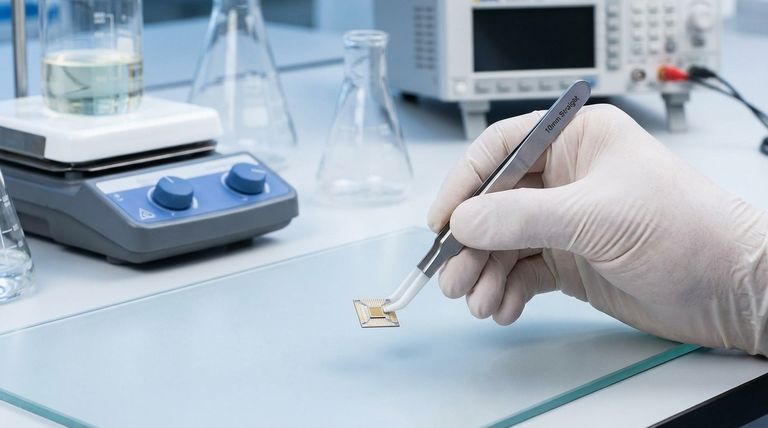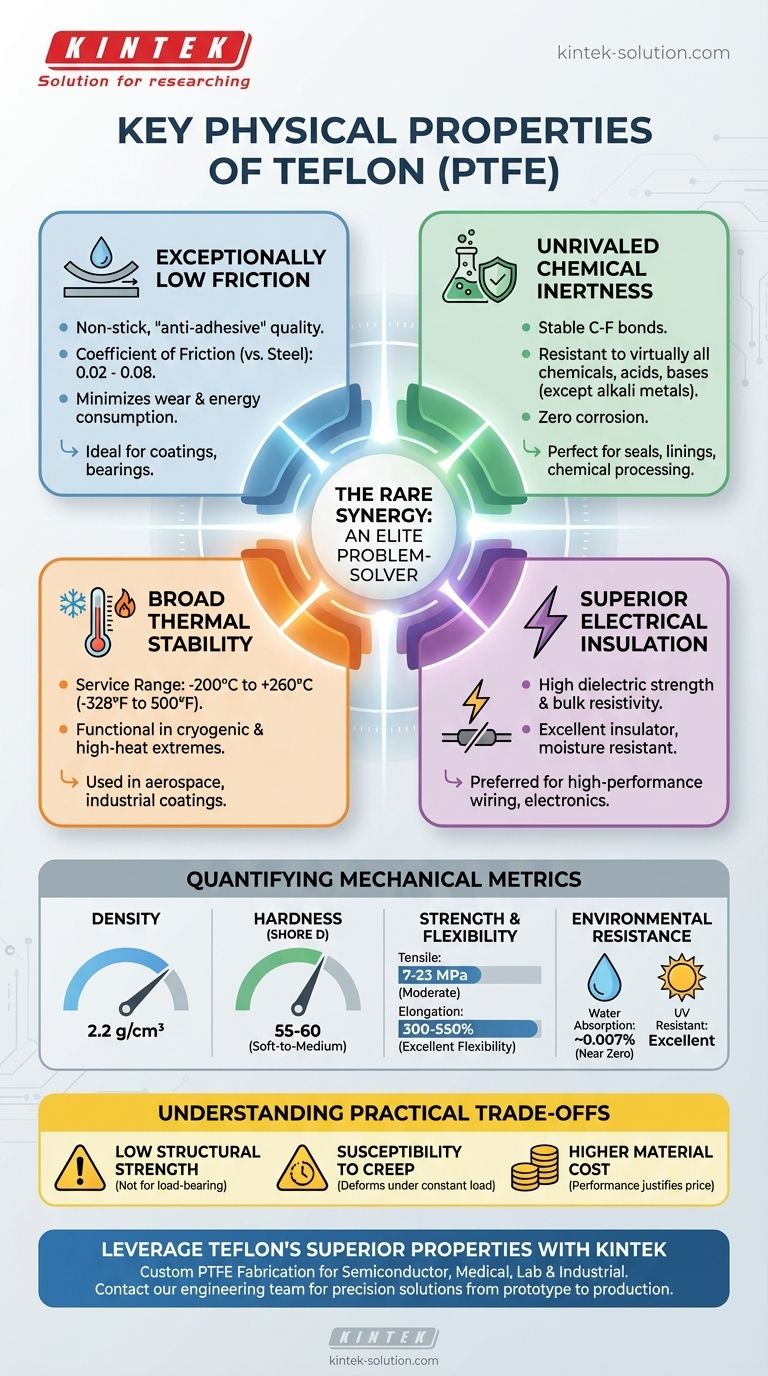At its core, Teflon (PTFE) is a fluoropolymer known for its remarkable combination of properties that make it a uniquely versatile engineering material. Its key physical characteristics include a high melting point around 325-327°C (600 K), a density of approximately 2.2 g/cm³, and an extremely low coefficient of friction against steel, typically between 0.02 and 0.08. These traits are complemented by its near-total chemical inertness and minimal water absorption.
The true value of Teflon lies not in any single property, but in the rare synergy of its characteristics. It is simultaneously resistant to extreme heat, virtually all chemicals, and adhesion, making it an elite problem-solver for the most demanding physical and chemical environments.

Deconstructing Teflon's Core Performance
To understand why Teflon is specified in such a wide range of applications, from aerospace to cookware, we must look beyond the numbers and examine the practical implications of its primary traits.
Exceptionally Low Friction
Teflon possesses one of the lowest coefficients of friction of any known solid material. This is the source of its famous non-stick or "anti-adhesive" quality.
This property minimizes the force required for surfaces to slide past one another, reducing wear, energy consumption, and material buildup in both consumer and industrial applications.
Unrivaled Chemical Inertness
The powerful carbon-fluorine bonds in Teflon's molecular structure make it incredibly stable and non-reactive. It is resistant to a vast range of corrosive substances, acids, and bases.
In fact, only highly reactive alkali metals are known to be capable of chemically affecting it. This makes it an ideal material for seals, gaskets, and linings in chemical processing equipment.
Broad Thermal Stability
Teflon maintains its integrity across a remarkable temperature spectrum. It remains stable and functional for continuous service from cryogenic temperatures as low as -200°C (-328°F) up to 260°C (500°F).
This allows it to be used in applications involving extreme cold, such as seals for liquid nitrogen, as well as high-heat environments like industrial coatings and non-stick cookware.
Superior Electrical Insulation
Teflon is an excellent electrical insulator, a property known as high dielectric strength. Its chemical stability and resistance to moisture contribute to its very high bulk resistivity.
This makes it a preferred material for high-performance wiring insulation, particularly in aerospace and computing where signal integrity and reliability are paramount.
Quantifying Teflon's Mechanical Makeup
While its performance characteristics are impressive, its specific mechanical metrics define its suitability for different physical roles.
Density and Hardness
Teflon has a relatively high density for a polymer, typically between 2.10 and 2.30 g/cm³.
Its hardness is rated between 55 and 60 on the Shore D scale, which classifies it as a soft-to-medium polymer. It is firm but can be scratched by harder materials.
Strength and Flexibility
Teflon exhibits moderate tensile strength (7–23 MPa) but excellent flexibility, with an elongation at break of 300–550%. This means it can stretch significantly before failing.
Its low flexural modulus (0.5–1.0 GPa) indicates that it is not a rigid material and will bend easily under load.
Resistance to Environmental Factors
Teflon is highly resistant to environmental degradation. It demonstrates almost zero water absorption (around 0.007%), meaning it will not swell or change properties in humid environments.
It also has excellent resistance to UV radiation, allowing it to be used in outdoor applications without breaking down from sun exposure.
Understanding the Practical Trade-offs
No material is perfect for every situation. Teflon's unique properties come with inherent limitations that are critical to consider during material selection.
Low Structural Strength
While tough and flexible, Teflon is not a structural plastic. Its relatively low tensile and compressive strength means it cannot be used for load-bearing applications where high rigidity is required.
Susceptibility to Creep
As a soft material, Teflon can be susceptible to "creep"—the tendency to slowly deform over time when under a constant load. This must be accounted for in designs for seals and gaskets that are under constant pressure.
Higher Material Cost
As a high-performance fluoropolymer, Teflon is generally more expensive than common commodity plastics like polyethylene or polypropylene. Its use is typically justified by performance requirements that other materials cannot meet.
Matching Teflon's Properties to Your Application
Choosing to use Teflon depends entirely on whether its unique strengths align with the primary challenge you need to solve.
- If your primary focus is low-friction or non-stick surfaces: Teflon's incredibly low coefficient of friction is its defining feature for coatings, bearings, and self-lubricating parts.
- If your primary focus is chemical resistance: Its near-total inertness makes it the default choice for seals, linings, and tubing in aggressive chemical environments.
- If your primary focus is electrical insulation: Its high dielectric strength and resistivity are ideal for high-frequency, high-performance cables and electronic components.
- If your primary focus is temperature stability: Its ability to perform reliably in both cryogenic and high-heat conditions makes it invaluable for aerospace and specialized industrial applications.
Ultimately, Teflon is a specialty material designed to succeed where conventional polymers fail.
Summary Table:
| Property | Typical Value / Characteristic |
|---|---|
| Melting Point | 325-327°C (600 K) |
| Density | 2.2 g/cm³ |
| Coefficient of Friction (vs. Steel) | 0.02 - 0.08 |
| Chemical Inertness | Resistant to virtually all chemicals |
| Water Absorption | ~0.007% |
| Service Temperature Range | -200°C to +260°C |
| Hardness (Shore D) | 55 - 60 |
| Tensile Strength | 7 - 23 MPa |
Leverage Teflon's Superior Properties for Your Application
Do your projects demand a material that offers unparalleled chemical resistance, extreme temperature stability, and a low-friction surface? The unique synergy of Teflon's (PTFE) properties makes it an elite problem-solver for the most demanding environments in the semiconductor, medical, laboratory, and industrial sectors.
KINTEK specializes in the precision manufacturing of custom PTFE components. Whether you need high-purity seals, durable liners, specialized labware, or any other fabricated part, we deliver solutions from initial prototypes to high-volume production runs. Our expertise ensures your components meet the exacting standards your industry requires.
Ready to solve your toughest material challenges? Contact our engineering team today to discuss your specific needs and discover how our custom PTFE fabrication can enhance your product's performance and reliability.
Visual Guide

Related Products
- Custom PTFE Parts Manufacturer for Teflon Parts and PTFE Tweezers
- Custom PTFE Parts Manufacturer for Teflon Containers and Components
- Custom PTFE Measuring Cylinders for Advanced Scientific and Industrial Applications
- Custom PTFE Volumetric Flasks for Advanced Scientific and Industrial Use
- Custom PTFE Teflon Balls for Advanced Industrial Applications
People Also Ask
- What industries use PTFE machined parts and for what applications? Critical Components for Demanding Environments
- What are the key advantages of PTFE? Unmatched Performance for Extreme Environments
- What are the key considerations when machining Teflon? Master Precision Machining for Soft Polymers
- What are the main advantages of using PTFE parts in industrial applications? Unlock Unmatched Chemical Resistance and Reliability
- How does PTFE contribute to low friction and wear resistance? Achieve Superior Performance with Advanced Materials



















